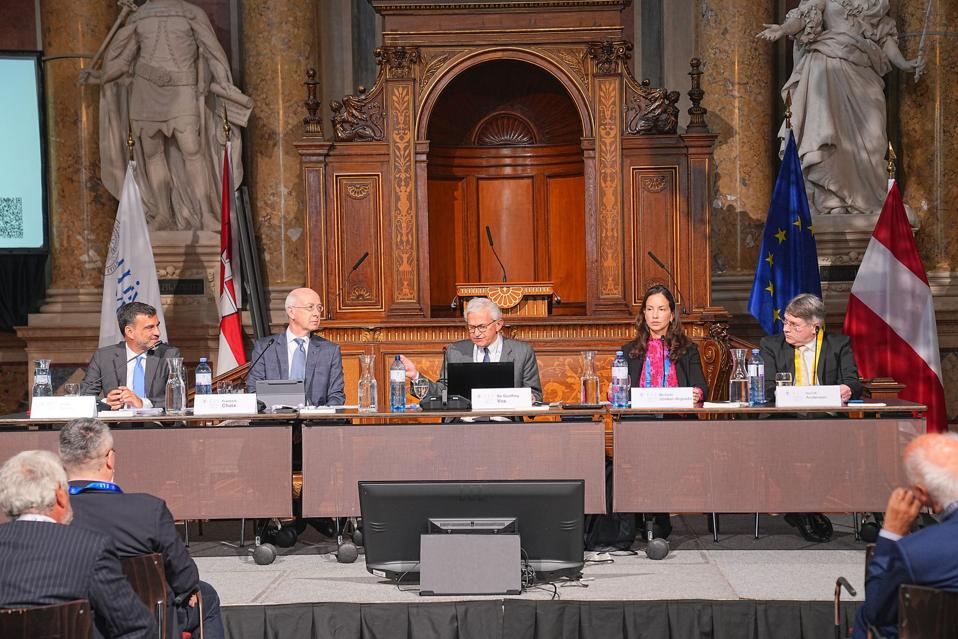In September, the European Law Institute held its annual meeting in Vienna, Austria. The meeting brings together judges, attorneys, professors, and policy experts from throughout Europe to discuss issues facing the European Union. As the international courts face a rise in cases relating to climate change, judges are struggling to address “climate justice” and new interpretations of legal rights and responsibilities. A panel at the 2025 ELI conference addressed these new challenges.
ELI is an independent legal think tank funded, in part, by the European Union to draft model rules and provide guidance on emerging topics, focusing on European legal development in a global context. ELI was founded in 2011 and is based at the University of Vienna. ELI Fellows gather in the fall for annual meetings that alternate between Vienna and other host countries in the EU. The 2024 annual meeting was hosted in Dublin, Ireland.
The panel was moderated by Sir Geoffrey Vos, ELI Second Vice-President, Master of the Rolls and Head of Civil Justice of England and Wales. The panelists were François Chaix, President of Swiss Federal Supreme Court; Michelle Jonker-Argueta, General Counsel, Greenpeace International; Henrik Anderson, Professor at Copenhagen Business School; and Rafael Benitez, Director of Social Rights, Health and Environment for the Council of Europe.
Voss summarized recent international court cases relating to climate change, starting with the European Court of Human Rights case, Verein KlimaSeniorinnen Schweiz and Others v. Switzerland, that established a human right to the protection against the adverse impacts of climate change within Europe. He also noted the recent advisory opinion by the International Court of Justice on the Obligations of States in respect of Climate Change. Both created an international framework for climate litigation.
Looking at civil litigation, the four elements of a civil case are standing, legal liability, establishment of causation, and damages. The panel focused primarily on standing, or the ability to initiate legal action.
Jonker-Argueta proposed a reframing of the topic, from challenges for judges to opportunities for judges. Calling it a climate crisis and noting the importance of courts and NGOs in addressing the issue.
Addressing the role of businesses and criminal liability, she argued that directors are responsible for GHG emissions and environmental harms. She sees movement on this issue in state courts in the United States.
Jonker-Argueta’s passion on this issue is evident in both her presentation and in private conversation. It is clear that she is a strong advocate that cares deeply about the environment and climate change, viewing it as a human rights issue.
Chaix noted the separation of powers and the roll of courts in political debate and policy making. Under Swiss law, standing is only created through specifically impacted people. Cases on behalf of third parties and groups is not permitted. Certain exceptions have been made for NGOs that meet defined requirements, but it does not currently extend to climate change. For now, the executive branch is not proposing to change the standing of NGOs in climate issues. The Courts make consider it.
Andersen addressed the “special nature” of climate change, noting the legislation and treaties may not be in place, causing . He stated that the exit from the Paris Agreement by the United States does not, in his opinion, exempt them from obligations under customary international law.
The Council of Europe, not to be confused with the European Union, was founded in 1949 to address human rights. It adopted the European Convention on Human Rights in 1950. The European Court of Human Rights, known as the ECtHR, interprets the application of the convention.
As a representative of the Council, Benitez addressed the ECtHR’s climate change opinion, Verein KlimaSeniorinnen Schweiz and Others v. Switzerland, noting that it does not stand alone, but is one of 300 cases on this issue. He stated it is not for the ECtHR to replace national courts or national parliaments. They play a role on specific issues brought to them relating to the Convention.
To the Court, climate change is being treated as a special condition, but standing is narrow. He also stated that the courts climate change opinion did not create a self standing human right to a healthy environment, rather a human right is specific cases.
Questions from the audience and the following debate focused on the role of judges and the use of courts to enact legislation. Jonker-Argueta dismissed the separation of powers question, asking who is influencing the policy making, calling for more involvement of the courts. As is common practice by members of the judiciary, the judges on the panel deferred on the question, noting it was their role to interpret law in the courtroom.
Benetiz said that “the role of courts and judges is to be courts and judges.” They should not be involved in activism or step into the role of the legislature or executive.
Andersen disagreed, stating that the courts are not engaged in activism. He believes “activism” is a term used too often to criticize courts that issue opinions that someone disagrees with. The courts serve in an interpretive role, not to create laws. As a result, he said, “if you disagree with the courts, take it to the legislature and get them to change the law.”
Climate change and climate justice will continue to have a growing presence in national and international courts. Judges will be faced with difficult decisions relating to the application of existing law and the question of how climate change fits into the existing legal framework.

